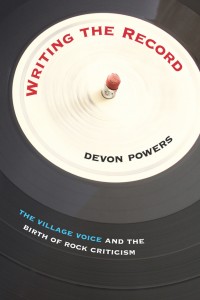Critical Commentary/Review: “Writing the Record” — Making Rock Criticism Safe for the Seminar Room
Any American arts critic worth his or her salt is part of a bohemian fringe, is aware of the political resonance of reviews, and is dedicated to sparking serious dialogue about arts and culture.
Writing the Record: The Village Voice and the Birth of Rock Criticism by Devon Powers. University of Massachusetts Press, 160 pages, $22.95.
By Bill Marx
I was rooting that Devon Powers would make good on the back cover blurb for her volume Writing the Record: The Village Voice and the Birth of Rock Criticism. “The book is sure to create quite a stir,” enthuses Jeffrey Melnick, “particularly vis-à-vis its persuasive claims about Robert Christgau and Richard Goldstein as major figures in postwar intellectual history.” Any attempt to show that rock critics — when they approach their jobs with distinction and style — are influential cultural players rather than just consumer guides is welcome. Even better, this book covers a fascinating period in American arts coverage—a time when critics were faced with the considerable challenge of coming up with a language that could be used to evaluate rock music. “To what sorts of uses could rock criticism be put?” asks Powers, “Was the deluge of new culture a reckoning or just one of marketing?” These are questions that continue to challenge critics today, who have to articulate whether they think new music is making a difference or is simply wasting our time.
But there has been no kerfuffle, at least so far. And I think I know why. Here and there Writing the Record lives up to its billing as a provocative examination of Village Voice critics as reflectors on as well as reflections of the intersection of popular music, the rise of hype, and left-wing politics during the ‘60s and beyond. But overall Powers’s mission is woodenly academic: rock criticism is “not merely” the “invention of a small number of individuals: it is a genre and the critic has a habitus, for which there are individual and historical but also collective and theoretical explanations.” The latter (collective and theoretical) explanations predictably wind up overwhelming the former. Making rock criticism safe for theory (“important forerunners of the academic study of popular culture”) undercuts any hope of seeing the incisive reviews of Goldstein and Christgau treated as a crucial part of American intellectual history; instead, they are cleared as source material for seminar room discussions about rock reviewing and the history of popular music.
Most academic studies of journalistic arts criticism are not particularly interested in or knowledgeable about the history or practice of reviewing. Instead, the professors are fascinated with what can be done with the material, thesis- and jargon-wise. For Powers (assistant professor of communication at Drexel University), the Village Voice reviews of Christgau and Goldstein need scholarly sanctification in order to be appreciated properly, their legitimacy resting on the definition of rock critics as “knowledge producers whose sociological and humanistic perspectives on music were not limited strictly to the management of taste or the maintenance of their own authority, nor were they ignorant of the ideological ramifications of music. Calling them public intellectuals is a stance that locates them within a tradition of bohemian intellectualism and recognizes the dynamic conversations that they instigated at precisely the moment often considered the denouement of American letters.” This notion of “public intellectual” is little more than fussy recalibration: any American arts critic worth his or her salt is part of a bohemian fringe, is aware of the political resonance of reviews, and is dedicated to sparking serious dialogue about arts and culture.
Why the nomenclature change? Critics make value judgments, but Powers wants to reclassify them as lecture room friendly “knowledge producers,” which makes them much more agreeable (defanged) in a culture uncomfortable with the idea of evaluation. But the truth is that reviewers are a particular kind of information makers—they stimulate discussion through the act of rendering a verdict, backing up their discriminations with persuasive reasoning. The notion that critics are iconoclastic because they are “independent voices who maintain artistic standards and encourage excellence” is played down early on by way of a quick reference to Britisher Matthew Arnold as “criticism’s most significant figurehead” and the birth of the reviewer-as-thumb-swinger. The history of American journalistic criticism of popular culture, its rich traditions and enduring intellectual tensions, are left out of the volume’s look at rock reviewing. Edgar Allan Poe (our iconoclastic critical figurehead), the rise of rebellious classical music criticism in small, ethnic magazines during the late nineteenth century, which led to the anti-genteel thunder of James Huneker and H. L. Mencken, the iron-fisted approach of classical music reviewer Virgil Thomson—not a word on these or other illuminating examples from the past.
The blanket category of “public intellectual” absolves Powers of making connections with the specifics of music criticism, aside from cursory mentions of jazz reviewing and how Susan Sontag and film critic Pauline Kael influenced Chrisgau and Goldstein. And even then the author doesn’t deal with the fertile contradictions between the apolitical stance of the former and the cultural engagement of the latter. For Kael, judgments about popular culture were not predicated on conventional evidence or detailed analysis. Reviewers articulated their discriminations by sharing their personal experience of the work. Thus the word “authentic” became an indispensable part of popular arts criticism in the ’60s—the reviewer’s lively description of his or her reactions (however eccentric, personal, surreal) to the art vouched for the elemental reality of its quality (or lack) to the reader. Critical reason was out—the aristocratic albeit anarchistic ebb and flow of consciousness were in. You would not know it from Powers’s book, but this rebellious stance of the period directly challenges the earnestly progressive ‘public intellectual’ approach she advocates in Writing the Record.
The strongest parts of Writing the Record come along when Powers dispenses with the “knowledge producer” nonsense, stops serving up potted histories of rock and other forms of popular music, and looks at the specifics in the writing of the critics. How did Goldstein discriminate strong rock music from the weak? How did changes in counterculture politics as well as music marketing influence how he articulated his judgments? In what ways does he remain a model for rock criticism? She is stronger on the pioneering career of Goldstein, who burned bright before disillusionment with the music burned him out, than on Christgau, who is admired for the impish self-consciousness of his persona—his confessional mode short circuits charges of white hegemony. Alas, far too often Powers turns rock criticism into a dispenser of politically correct fairy dust, with Goldstein and other white critics predictably falling short on the identity politics front. Too bad she never engages with the powerful counter arguments (as rock critic Ellen Willis did), taking on the existential nihilism of Lester Bangs and the anti-political subversiveness of Kael, which treasure popular art’s rejection of liberal cliches.
In an interview about her book on Pitchfork, Powers is asked whether rock music criticism today is pointless. She responds that “we need music criticism because people like writing it and people like reading it. It’s as simple as that.” But it isn’t as simple as that. A lot of what is enjoyed as criticism today on and off the Web is no more than superficial reactions, yelps of approval or disapproval. The most pressing issue is not that Village Voice rock critics need to be classified as respected contributors to theoretical considerations of popular music—it is that the definition of criticism is being dumbed down.
In her book’s conclusion, Powers sees that a case has to be made for the importance of rock criticism, and she argues that reviewing is necessary because of its ability to “start conversations, catalyze interest in music, and produce knowledge.” It does those things, but its essential virtue is to articulate—by way of powerful acts of judgment—the value of popular art. At its best, the criticism of Goldstein and Christgau challenge our culture’s wholesale denigration of discrimination, a monocultural leveling (“everyone’s opinion is equal”) that is happening in academia as well, where all texts become fodder for endless analysis rather than hard-headed evaluation. We are all just ‘knowledge producers’ now, but criticism has not always been reduced to such an equalitarian game. Goldstein and Christgau are indispensable examples of sharp-eared criticism—why demote them into toothless public intellectuals?
Tagged: Devon Powers, Richard Goldstein, Robert Christgau, Village Voice



Glad to know I’m not the only one who didn’t like this book. There are many a very long winded Q & A with Christgau floating around the Internet that are far more entertaining and far more enlightening than this book.
The critic on the critic is also necessary; someone’s got to keep an eye on the gatekeepers.
I received this response via e-mail and it gives me a chance to clarify an issue:
When Wood recommends My Struggle by Karl Knausgard or works by Laszlo Karsznahorkai in the pages of the New Yorker he is part of the bohemian fringe. The best journalistic arts critics are outsiders — even if they write for mainstream publications. When Woods brings valuable but overlooked writing to the attention of his readers — or argues that the overpraised emperor of the hour has no clothes, he is doing what the best critics are supposed to do.